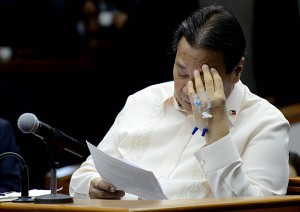Section 7, Article VIII, of the Constitution requires that a Supreme Court justice be a natural-born Filipino, at least 40 years old and must have been a judge of a lower court or engaged in the practice of law in the country for at least 15 years.
The Constitution also requires that a member of the judiciary “must be a person of proven competence, integrity, probity and independence.”
The Judicial and Bar Council (JBC) has the primary function of recommending appointees to the judiciary, as required under Section 8, Article VIII, of the Constitution.
The JBC is composed of the Chief Justice as ex officio chairman, the secretary of justice, and a representative of the Congress as ex officio members, a representative of the Integrated Bar of the Philippines, a professor of law, a retired justice of the Supreme Court and a representative of the private sector.
In fulfillment of its function, the JBC submits to the President a list of at least three nominees for every vacancy in the judiciary. From this list, the President makes his choice.
A vacancy on the Supreme Court must be filled within 90 days from its occurrence.
The selection process for nominees for judicial offices, including that of Chief Justice, is specific:
The JBC first announces the vacancy, and an active, nationwide search for candidates follows. Applications and recommendations are submitted to the JBC secretariat.
The applicants are evaluated based on their qualifications and background. They also undergo physical and psychological examinations.
A notice about the candidates is published by the JBC secretary in two newspapers. The notice informs the public that any complaint against a candidate may be filed with the secretary within 10 days.
The candidates concerned have five days from receipt of the complaints to file their comments.
Those who pass the initial screening are interviewed by the JBC.
The council subsequently meets for the final deliberation to choose the candidates to be recommended to the President.
To be considered a nominee, a candidate must obtain the affirmative votes of the majority of the JBC members. On the question of integrity, a candidate is automatically disqualified on the negative vote of even just one JBC member.
Once appointed by the President, the justice will serve on the Supreme Court, during good behavior, until the mandatory retirement age of 70, or until he or she becomes incapacitated. Lawrence de Guzman,Inquirer Research
Sources: 1897 Constitution; Judicial and Bar Council
